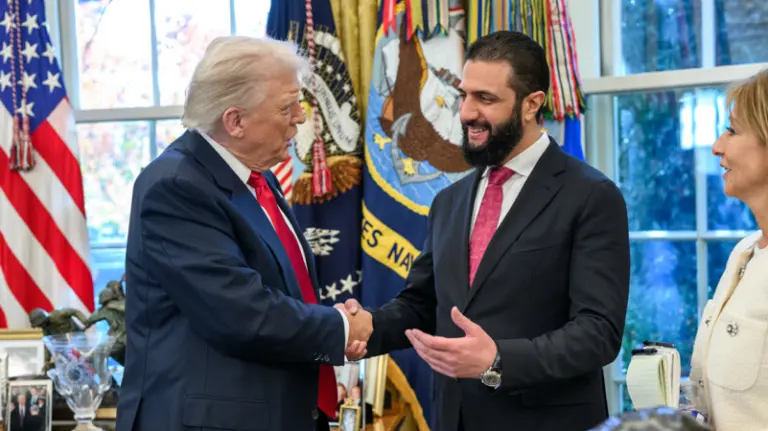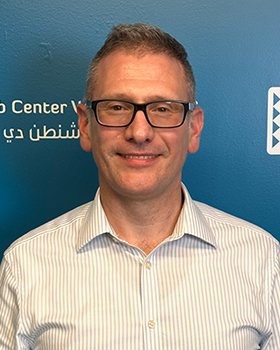
At first glance, US President Donald J. Trump and Syria’s interim President Ahmed al-Sharaa inhabit very different political universes. Trump, the populist president of a prosperous global power, is known for his bombastic rhetoric and improvisational style. Al-Sharaa, a former militant now commanding a fractured state in a devastated postwar country, has cultivated precisely the opposite political image—that of a patient, strategic, and quietly assertive leader. Yet when the two men met on November 10, 2025, at their historic White House summit—the first time a Syrian president has ever entered the Oval Office—they may have found more in common than either one expected. Beyond their newly convergent security interests, both Trump and al-Sharaa confront curiously parallel domestic predicaments: institutions weakened, legitimacy contested, and political power hanging on personal relationships and the performance of control.
Like many Syria observers, Trump seems impressed by al-Sharaa’s remarkable journey from jihadi to statesman. “A young, attractive guy,” Trump said of al-Sharaa. “Tough guy. Strong past. Very strong past. Fighter.” As a 20-year-old, al-Sharaa left Syria in 2003 to become an al-Qaeda foot soldier in the insurgency against the US occupation of Iraq. During his five years inside US prison camps, including Abu Ghraib and Camp Bucca, al-Sharaa built a loyal following among fellow inmates and rapidly climbed the al-Qaeda career ladder. Upon his release in 2011, as Syria rose up in revolt against the Assad regime, al-Sharaa was tasked by al-Qaeda’s senior command with building a Syrian affiliate. The organization he founded, Jabhat al-Nusra, was soon remade by the country’s civil war, transforming from a clandestine jihadist cell into one of the conflict’s most formidable political and military actors—and one that increasingly had an eye on the Syrian national context rather than on global jihad. By 2015, al-Sharaa had decisively broken with the so-called Islamic State (IS); by 2017, al-Sharaa had severed ties with al-Qaeda and given his group a new name. Al-Sharaa’s organization efficiently absorbed or eliminated rival militias and emerged as the de facto ruler of rebel-held Idlib province in northwest Syria between 2017 and 2024. Since seizing Damascus in December 2024, al-Sharaa’s time in office has been characterized by the political pragmatism that he learned while governing the northwest—and his ruthless suppression of militant challengers such as Islamic State.
Al-Sharaa’s credible history of opposition to IS has no doubt helped cement Trump’s acceptance of Syria’s new (and ostensibly transitional) president as a viable security partner. Their White House meeting is widely expected to result in the announcement that Syria has formally joined the global coalition against IS, which has lost its territorial foothold but continues to mount attacks in eastern Syria in particular—and which might in the future emerge from the ashes if Syria again succumbs to chaos. But two challenges immediately present themselves.
First, the United States already has a key Syrian ally in the fight against IS: the Kurdish-dominated Syrian Democratic Forces (SDF), whose autonomy from or integration into the structures of the national state is a bone of contention between Damascus and the regional administration in the northeast. Leaving these tensions unresolved will likely undermine a coherent anti-IS campaign. Second, the militia coalition that brought al-Sharaa to power includes Islamist elements, many from outside the country, that espouse a far more radical agenda than Syria’s current leadership does. Al-Sharaa’s formal adherence to the US-led campaign may produce friction within his own camp. Aware of this risk, the Syrian government has been quick to deny rumors of agreement to open a new US military base in Damascus. Recent clashes between government forces and foreign fighters in Idlib may presage more conflict to come.
Trump’s partnership with al-Sharaa has received the blessing of regional allies who want a strong leadership of a unified Syria in order to re-establish regional linkages severed by the war. Turkey now plans to reopen its land trade corridor to Jordan and the Gulf Cooperation Council by 2026; Ankara, Damascus, and Amman are discussing rebuilding the iconic Hijaz railway linking Damascus to Medina; and Riyadh wants to build data cables through Syria to Europe to realize its ambition of transforming Saudi Arabia into a global hub for artificial intelligence. Despite the eye-popping amounts of money promised to Syria by Saudi Arabia, Qatar, and the United Arab Emirates, however, Syria is unlikely to have a comprehensive masterplan to channel funding to where it is most needed to support reconstruction for maximum social benefit. With the days of state-led developmentalism well behind us, Syria will have no Marshall plan equivalent drawn up in the national interest—instead, reconstruction will be confined to an archipelago of investment enclaves chosen on entirely private grounds of profitability and personal connections.
Trump’s real estate background has famously shaped his view of politics as a series of business transactions, yet al-Sharaa also seems to favor personal ties over institution building. Syria’s new authorities were quick to confirm that the country would henceforth adopt the principles of free market economics—an approach that has so far seen al-Sharaa regime associates allegedly appropriate Assad-era business interests, a new wave of opaque luxury real estate development deals, and the presidency extend executive authority over key investment vehicles, including a new sovereign wealth fund, beyond democratic oversight. Reconstruction in Syria increasingly looks like it is inspired by the same kind of entrepreneurial urban development and crony capitalism that primarily benefited postwar business elites in 1990s Lebanon and excluded most of the population.
Trump and al-Sharaa share one last common feature: the way in which their personalities have become the main topic of discussion. Both the populist and the pragmatist operate in a political environment where mediating institutions—those of parties, bureaucracies, media, even elections—have lost credibility. In the vacuum, attention focuses on political leaders’ biographies, personal relationships, and even emotive states. When institutions are in crisis, personalities come to the fore. While the United States wrestles with the need to restore checks and balances in the face of the rampant expansion of executive power, Syria struggles to find a path from personalist regime to stable state. In each case, the challenge is similar: how to rebuild legitimate authority without reducing it to the reflection of a single individual.
The views expressed in this publication are the author’s own and do not necessarily reflect the position of Arab Center Washington DC, its staff, or its Board of Directors.
Featured image credit: TruthSocial/Donald Trump

